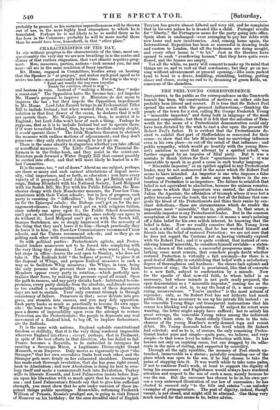THE PEEL-YOUNG CORRESPONDENCE.
DISTASTEFUL to the public as the correspondence on the Tamworth tumult has been, the construction of motives on either side has probably been liberal and correct. It is true that Sir Robert Peel opened the series with the grossest indiscretions,—thenking the people of the town for a riot, calling Mr. George Frederick Young a " miserable impostor," and doing both ine of the most unsound composition; but then it is felt that the_ of Tam- worth for the scene of a Protectionist demonstration could only have been dictated by the wish to cast a slur upon the present Si Robert Peel's father. It is evident that the Protectionists sired to exhibit that part of Staffordshire as recovered for their cause—to show that the late Minister had no surviving iiifthence even in his own place—to cut off the entail of that influence : and public sympathy, which would go heartily with the young Baro- net's ambition to meet that attempt by a spirited rebuff, was further engaged by an impulse of filial piety. But it was a mistake to thank rioters for their " spontaneous burst " ' • it was lamentable to speak in so good a cause in such trashy language. " Miserable impostor," as an epithet applied to any Protectionist may be not undeserved in the sense which Sir Robert Peel seems to have intended. An impostor is one who imposes a false belief upon another; and to make any man believe in the res- toration of Proteetion is an imposture. The failure to establish that belief is not equivalent to absolution, because the animus remains. The scene to which that imposture was carried, the allusions to Julian the Apostate, the affectation of triumph where it was but a paltry bravado over the tomb, the very fact of the failure that con- geals the blood of the Protectionists and thins their ranks by con- stant defeetions,—these are circumstances which do render the imposture most " miserable," that is, pitiable. In that sense, a miserable impostor is any Protectionist leader. But in the common acceptation of the term it means more—it means a man's palming off a false belief for his own selfish interest, he knowing that the belief is false. Now we readily conceive that Mr. Young lives in such a whirl of excitement, that he has worked himself and friends into the belief of restored Protection ; we are not sure that he does not regard the Customs Act as having virtually expired with Sir Robert Peel ; and it is quite evident, that instead of con.- sidering himself miserable, he considers himself enviable—a states- man, a chosen of the nation, a successful prosperous man. Still a lurking sense must remain, that somehow people doubt whether restored Protection is virtually a fait accompli—for there is a good deal of difficulty in establishing that belief with a satisfactory degree of thoroughness and hardness : the cheers lack aplomb and heartiness of ring; the belief is provisional, like, that of converts to a new faith, subject to confirmation by a miracle. Now for the apostle of that new-old faith, to whom belief is so necessary, but whose miracle is not quite ready prepared, the open denunciation as a "miserable impostor," coming too as the endorsement of a riot, is, to say the least of it, a- most exaspe rating inconvenience. " You're another" is the most natural of rejoinder; only, as Sir Robert Peel has not hitherto had much public life, it was necessary to use up his private life instead : so the venerable Young flings out transparent insinuations that his censor is a blackleg and no spokesman. If subject for retort were wanting, the letter might amply have sufficed; but to satisfy his great revenge, the venerable Young rakes among the indiscreet Baronet's wild oats; the fluent elderly Cicero riots in the mis- chances of the young Member's newly-donned toga and recent abet. Mr. Young descends below the level which Sir Robert had selected; and as he is, of orators, the only remaining Protec- tionist leader pure and simple—quite pure, we believe, and very simple—to that lower level he takes Protection with him. It has become not only an expiring cause, but one dragged by its adhe- rents in the mire of rioting, and supported. by scurrility.
Through all the ugly squabble, the memory of Peel stands un- touched, immoveable as a statue ; painfully reminding one of the place which was open to the eon, if he had chosen to take the pains of stepping into it It was worth while to take some pains, if not to continue Peel's work, at least to support the dignity of
being his successor; and Englishmen would always rendered attention and respect to the eon of such a man, merely because he was the son. But the successor has chosen to be in his own per- son a very untoward illustration of our law of succession • he has elected to succeed only " to the title and estates "—an Unlucky exemplar of primogeniture. The post of dignity, indeed, though -vacant, is not closed, and might still be attained. One thing very much needed for that seems to be, better advice.


























 Previous page
Previous page